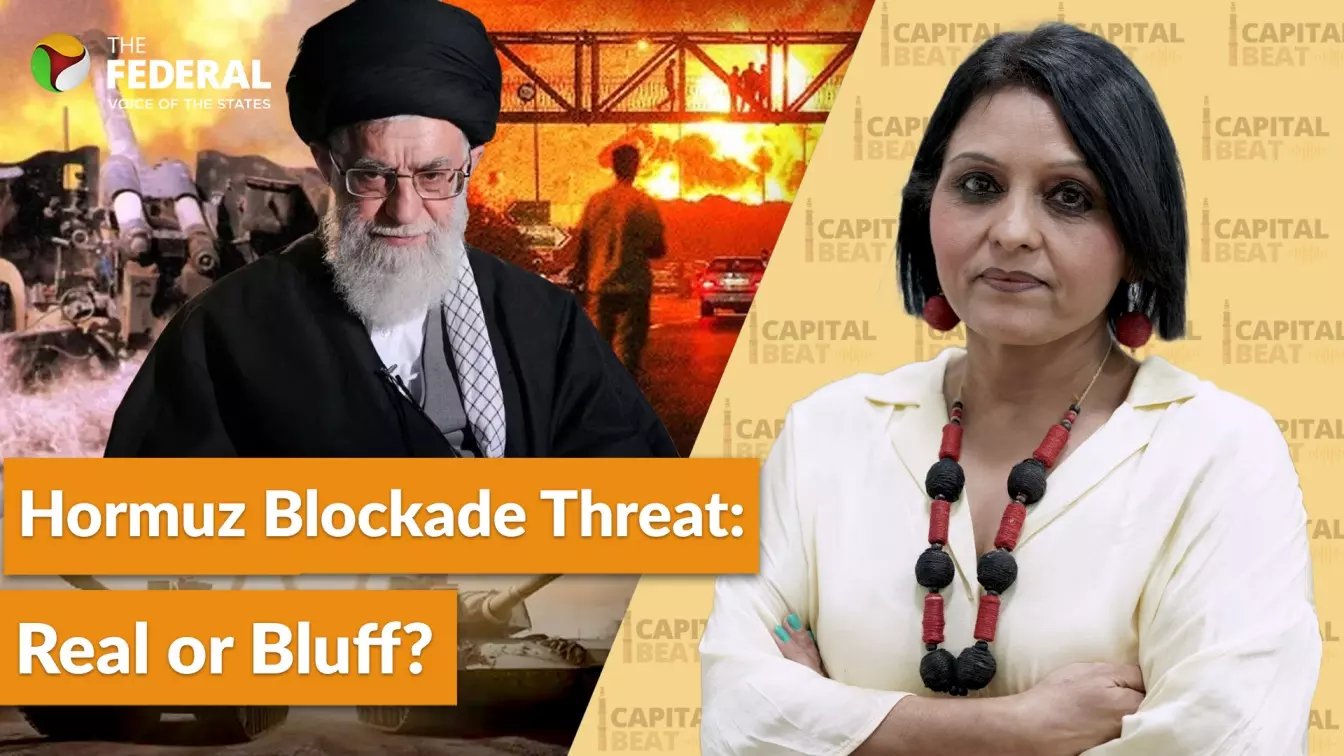
Iran parliament backs Hormuz closure; will it isolate Tehran further?
Iran threatens to block key oil route after US strikes—will it follow through?

As tensions escalate in West Asia (Middle East), Iran's parliament has approved a move to close the critical Strait of Hormuz in response to the US strikes on Iranian nuclear sites.
In this episode of Capital Beat, economist Prof. NR Bhanumurthy and international affairs expert Prof. Aftab Kamal Pasha join host Neelu Vyas to decode whether the threat is symbolic or could upend global oil supply and geopolitics.
Economic risks for India
Prof. Bhanumurthy warned that closing the Strait of Hormuz could push India into an energy and inflation crisis. “If this move is real, oil prices will surge, and that would hit our economy on multiple fronts—fiscal stress, rising inflation, and external imbalances,” he noted.
He explained that India has been diversifying oil imports but it still heavily depends on the Gulf. "We import 2 million barrels daily from the region. There are strategic reserves, but they will not last long if this prolongs,” he said.
Short-term risks may be manageable, but sustained disruption, he stressed, could spike oil prices and impact India’s macroeconomic stability. “There’s talk of oil touching $200 a barrel if things go out of hand. That would be catastrophic.”
Also read: Iran-Israel conflict: Strait of Hormuz, if shut, could send fuel prices in India soaring
Tehran’s provocation or desperation?
Prof. Pasha placed the decision in a geopolitical context. “Iran is reacting to unprovoked attacks by Israel and the US on its nuclear and civilian facilities. This is a grave violation of international law,” he argued.
He dismissed the idea that Iran’s closure move is mere rhetoric. “Iran has the naval capabilities—submarines, patrol boats, and more—to choke the Strait. It's not like the Red Sea route, where there are alternatives. This is a full choke point.”
However, Prof. Pasha acknowledged the complexities involved: “Iran also depends on this route for its oil exports, especially to China. A full closure would hurt itself too. So, they may target only hostile nations’ shipping—flags of Israel, US, UK, or France—rather than enforce a total blockade.”
Also read: Iran-Israel conflict a tough balancing act for India: Michael Kugelman
Global economic implications
According to Prof. Bhanumurthy, while oil prices remained subdued for a long time, any escalation now would be dangerous. “A sudden spike to even $100 is manageable. But $200 oil? That’s a global crisis.”
He warned of risks to global supply chains, inflationary pressures, and recession fears. “We’re closely linked with the global economy. Any supply break in energy or shipping will hit us hard.”
Prof. Pasha added, “If Iran selectively targets ships, insurance premiums will shoot up, shipping costs will rise, and uncertainty will paralyze global trade. Gulf nations import everything—from food to drinking water. Their lifeline runs through Hormuz.”
Also read: Iran-Israel conflict : Why India’s LPG supply could get affected
Iran's message to the world
Prof. Pasha explained that the Iranian parliament’s approval of the move serves a strategic purpose. “They are signalling capability, not necessarily intent. The debate and approval give legitimacy—both internally and globally—to Iran’s right to retaliate.”
He emphasized the symbolic weight: “This isn't just about retaliation. It's a message to neutral countries—your oil, your ships, your economy aren't safe if you remain silent on American and Israeli aggression.”
Still, he noted, Iran is aware of the economic costs to itself and may not fully implement the blockade unless provoked further.
Also read: 'We heard blasts': Indian student recalls horror and fear after evacuation from Iran
US vulnerability and Trump’s gamble
On Trump’s aggressive stance and renewed threats of regime change, Prof. Pasha was blunt. “Trump is under pressure from Netanyahu and the US deep state—military-industrial complex, neocons, and donors.”
He warned of potential blowback: “Iran has sleeper cells. If the conflict escalates, expect retaliation globally—against American and British assets, not just in the Gulf.”
Even the US embassy in Qatar has warned citizens to shelter in place. “This is serious,” Pasha said. “Trump promised not to start wars, but now American lives are at risk. He may have bitten off more than he can chew.”
Also read: Families in Lucknow worried as relatives on pilgrimage trapped in war-torn Iran
India’s options and the road ahead
Both experts agreed that India must prepare for the fallout. “We may have to fall back on Russian oil again,” said Pasha. “We already defied US sanctions on that front once. If Gulf supplies get hit, what choice do we have?”
Prof. Bhanumurthy cautioned, “Anything above $100 a barrel will disturb our budget, inflation targets, and recovery path. It's not just about oil. The shipping uncertainty affects everything.”
(The content above has been generated using a fine-tuned AI model. To ensure accuracy, quality, and editorial integrity, we employ a Human-In-The-Loop (HITL) process. While AI assists in creating the initial draft, our experienced editorial team carefully reviews, edits, and refines the content before publication. At The Federal, we combine the efficiency of AI with the expertise of human editors to deliver reliable and insightful journalism.)

